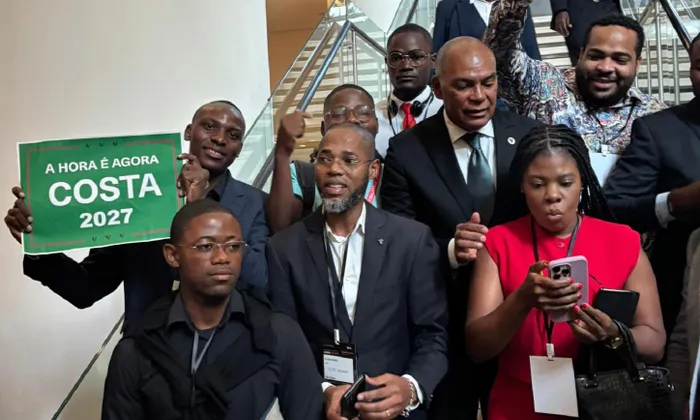
At the event, 100 MAKAS, Costa Júnior repeatedly stressed the need for deeper business collaboration with the US, advocating for less government intervention and more private-sector growth.
Image: Supplied
DURING the “III Edição das Conversas Economia 100 Makas”, an event hosted by economist Carlos Rosado de Carvalho, Adalberto Costa Júnior, the leader of UNITA, did more than just talk policy.
He launched what now appears to be the official start of his 2027 presidential campaign, signalling a bold shift in Angola’s political landscape. The forum, which was meant to address macroeconomic reforms, quickly turned into a platform for Costa Júnior’s emerging vision for the country, one focused on economic liberalism, international cooperation, and a clear pivot toward the United States.
While the ruling MPLA wrestles with internal divisions and corruption allegations, UNITA has taken the offensive, and the message is clear: the black rooster is ready to rule.
At the event, 100 MAKAS, Costa Júnior repeatedly stressed the need for deeper business collaboration with the US, advocating for less government intervention and more private-sector growth. His speeches left no doubt about his pro-market leanings, echoing policies favoured by Western conservatives.
But it wasn’t just the words — it was the optics too. Observers couldn’t help but notice that the new Unita campaign visuals look strikingly similar to Donald Trump’s 2024 posters. The fonts and overall layout suggest more than a coincidence.
Some political analysts speculate that Republican-aligned strategists may already be advising Unita behind the scenes, potentially marking the beginning of a US-backed political shift in Angola. This wouldn't be unprecedented; the US has a long history of engagement with Unita, stretching back to the Cold War.
A few days before Costa Júnior’s appearance at the event, 100 Makas, two symbolic events unfolded that highlighted a widening geopolitical gap between Angola’s two dominant political factions. On July 4th, Adalberto Costa Júnior attended the US Independence Day celebration in Luanda, using the opportunity to speak with journalists, including RTP África, about Angola–US relations.
He emphasised that the current global moment demands rapprochement with the Americans, and reiterated Unita’s willingness to engage with US business and diplomatic leadership.
Meanwhile, President João Lourenço jetted off to Brazil for the BRICS summit in Rio de Janeiro, joining heads of state from China, Russia, and other non-Western powers to discuss strengthening South–South cooperation. The contrast was unmistakable: Lourenço, whose popularity has waned, appears to be hedging Angola’s future on an Eastern axis, a move that might alienate Western backers.
With US President Donald Trump already threatening 10% tariffs on countries deepening ties with BRICS, Lourenço’s shift looks increasingly risky. In the eyes of many, Washington is already warming to the idea of a post-MPLA Angola, and Unita is emerging as the preferred partner.
If elected, Costa Júnior has promised to implement a neoliberal economic model, drastically reducing the role of the state in favour of private sector innovation. At the event, 100 Makas, he voiced admiration for the policies of Argentina’s Javier Milei, the Australian economic system, and even China’s model of state-managed growth.
The hybrid nature of his outlook suggests that Costa Júnior is not blindly following the West but rather selecting best practices across ideological lines to position Angola as a competitive, business-friendly nation.
Still, the symbolism of Unita openly courting the US while the MPLA doubles down on BRICS has not gone unnoticed.
Many Angolans, especially in urban and educated circles, are growing weary of the status quo. The MPLA, plagued by scandals surrounding infrastructure projects like the Lobito Corridor and shadowy ties to global firms such as Trafigura, now faces an opposition that’s sharper, younger, and better connected internationally than ever before.
For the first time in Angola’s post-independence history, Unita has a real shot at power, and the international chessboard seems to be shifting in its favour. With a faltering MPLA, an assertive opposition, and Washington possibly back in Unita’s corner, 2027 may mark the dawn of a political revolution in Angola.
If Adalberto Costa Júnior continues to ride the momentum from MAKAS 100, leverages US support, and presents a clear break from Angola’s authoritarian past, then the winds of change could sweep in a new era, one defined not just by who leads but by which world they choose to lead Angola into.
* Dr Eric Hamm is a professor of political science and a strategic researcher. The views expressed here are his own.
** The views expressed here do not reflect those of the Sunday Independent, Independent Media, or IOL.